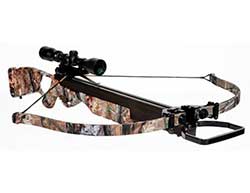
Crossbow Policy Position Statement
The Pope and Young Club was founded to promote bowhunting and to record for posterity the outstanding examples of North American big game animals taken solely with the hunting bow.
For the purpose of the Pope and Young Club, a bow shall be defined as a longbow, recurve bow or compound bow that is hand-held and hand-drawn, and that has no mechanical device to enable the hunter to lock the bow at full or partial draw. Other than
the energy stored by the drawn bow, no device to propel the arrow will be permitted.
Consequently, the Pope and Young Club does not consider the crossbow to be a hunting bow and will not accept any trophies collected by crossbow hunters. Further, the Pope and Young Club considers the use of crossbows during bowhunting seasons to be
a serious threat to the future of bowhunting.
The Pope and Young Club therefore recommends the crossbow should not be considered for use in any bowhunting only season. Also, the Club strongly recommends that crossbow hunting be abolished from all existing bowhunting only seasons. We encourage
all states and provinces which desire to allow use of crossbows for hunting big game, to require mandatory crossbow specific education, licensing, seasons and reporting requirements.
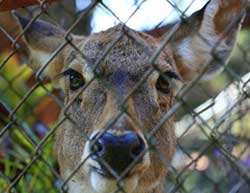
Canned Shoots Position Statement
The Pope and Young Club condemns the killing of big game animals in artificial situations where animals are held in captivity, or released from captivity. Inappropriately referred to as “canned hunts,” these actions are devoid of any resemblance
of fair chase hunting.
Beyond the Club’s position that game-proof fenced enclosures are not fair chase because the animals are not free-ranging, these canned shoot situations present further concerns impacting the future of bowhunting, weaken the public acceptance
of legitimate fair chase bowhunting, provide possibilities for transmitting diseases, and corrupt the North American Model of Wildlife Conservation. Animals held, or bred and raised for the purpose of trophy harvest, in these facilities are
not wildlife, rather, are privately owned livestock. The killing of these animals is not managed by the authority of a wildlife management agency. And the killing, itself, is devoid of any values embodied by legitimate hunting. The Pope and Young
Club does not accept into its Records Program any animal taken under any captive scenarios.
High Fence Position Statement
The Pope and Young Club does not consider game-proof fenced enclosures to be a condition meeting the basic tenets of Fair Chase. Fair Chase is defined as the ethical, sportsmanlike and lawful pursuit of free-ranging wild game animals in a manner
which does not give the hunter an improper or unfair advantage over the animal.
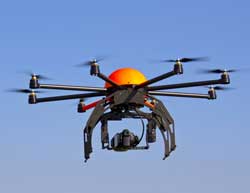
Drones Position Statement
The core values of the Pope and Young Club revolve around the principles of high standards of conduct and ethics in our bowhunting lifestyle. The Club believes that an ethical code is necessary for all responsible bowhunters and is the key to protecting
bowhunting’s future in our society. The concept of fair chase is a component of an ethical code. Simply defined, fair chase is the ethical, sportsmanlike and lawful pursuit of free-ranging wild game animals in a manner which does not give
the bowhunter an improper or unfair advantage over the animal. In addition to following all bowhunting laws and regulations, adherence to the Rules of Fair Chase is required by anyone submitting an entry into the Club’s Records Program. Though such
rules focus on the pursuit itself, the spirit of fair chase is an attitude and a way of life based in a deep-seated respect for wildlife, for the environment and for other individuals who share the bounty of our natural resources.
Drone/UAV-assisted Bowhunting: Unmanned Aerial Vehicle Systems (commonly called “drones”) are familiar as a military aerial reconnaissance and weapons platform. They are increasingly playing a more popular role in civilian life.
UAV’s have high potential to contribute to the fields of wildlife biology, search-and-rescue, agriculture and many other applications. However, use of these highly sophisticated remote-controlled aircraft to scout, monitor and stalk North
American big game to aid in bowhunting activities is a fundamental violation of the rules of Fair Chase. The Pope & Young Club believes the use of this technology as a bowhunting aid represents a significant threat to fair chase bowhunting and
fair distribution of bowhunting opportunity.
We urge all Pope & Young Club members to refrain from using Drones/UAV’s to locate, monitor, scout or stalk any North American big game species. UAV-assisted bowhunting violates the existing rule that states, “you may not use electronic devices
for attracting, locating, or pursuing game, or guiding the hunter to such game.”
While the Pope & Young Club acknowledges the potential use of UAV’s for purposes of science and game surveys and even to attain non hunting shots such as scenery, etc. for outdoor television shows, we feel strongly that in order to protect the
principles of fair chase and fair opportunity, UAV’s may not be used as a bowhunting aid. We have a responsibility to make sure that bowhunting remains a primitive pursuit involving woodcraft and skill, not merely exploiting technology.
Accordingly, P&Y supports efforts by state wildlife authorities to ban the use of UAVs to aid or assist in bowhunting.
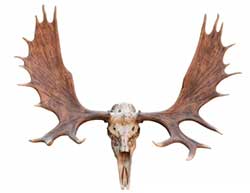
Antler/Horn Buying Position Statement
The Pope and Young Club does not condone the buying or selling of wildlife. This includes antlers and horns.
The unparalleled success of wildlife conservation, and subsequently our hunting heritage, is a direct result of the establishment and maintenance of the North American Model of Wildlife Conservation. one of the key principles of the North
American Model of Wildlife Conservation speaks to the notion of trade in wildlife and wildlife parts: the elimination of markets and commerce of wildlife.
In present day, the practice of buying/selling antlers and horns inevitably contains an abuse of the Boone & Crockett / Pope & Young scoring system. Using score to assign monetary values to animals (and antler/horns) is counter
to the very purposes and objectives of the scoring system.
This act defies the very purpose we hunt, the values that hunting teaches and the public acceptance of hunting. Furthermore, the exorbitant figures often attached, coupled with tremendous media and “industry” attention can lead to either unethical
and illegal behavior by some, or the perception that such behavior is pervasive.
To that end, the Pope and Young Club has a policy that removes our volunteer certified measurers from any involvement with the buying and/or selling of antlers/horns and those that do so.
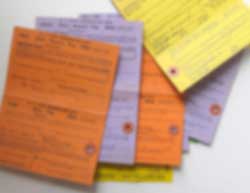
Party Hunting Position Statement
Party hunting, also known as cross-tagging or proxy hunting, is the practice of one person tagging an animal he or she has taken with the tag of another person. This practice is illegal in most states and provinces.
The Pope and Young Club’s Member Code of Conduct notes that a hunter should never shoot more than their legal share in a hunting season. That “legal share” would be defined by regulation as the number of animal tags one hunter can possess in
a season.
For the purpose of its Records Program, the Pope and Young Club does not accept animals taken under “party hunting” situations. A bowhunter must have legally shot the animal and used their own tag to legally register the animal. In the
case of a one-buck-limit, for instance, to be eligible for entry into the Records, the animal must have been the first buck taken by the bowhunter and have been tagged by that bowhunter.
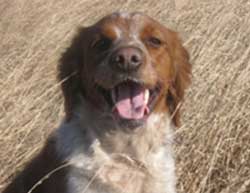
Tracking Dogs Position Statement
(Amended 9-30-21)
The Pope and Young Club recognizes that the use of tracking dogs to locate a wounded animal is becoming an increasing popular tactic and is being legalized in many jurisdictions. The Club supports the philosophy that it is the responsibility
of an ethical hunter to expend all reasonable effort in recovering a wounded animal.
To the same degree, though, the Club believes it important that a hunter learn and master the traditional practices of blood trailing and tracking. These skills are inseparable components of a well-rounded hunter and are important woodsmanship
values of the overall experience. Further, the Club is concerned that certain technologies and practices can be used as a crutch and actually supplant the basic skills expected and desired of a bow hunter.
As such, the Pope and Young Club will accept record book entries recovered with the use of trained tracking dogs with the following conditions/provisions:
- The use of a tracking dog(s) must meet ALL state or provincial laws in the jurisdiction you are hunting that governs the use of tracking dogs for wounded animals.
- The dog must meet all local requirements concerning training and/or licensing.
- The recovery must be completed within 48 hours of the initial shot and the hunter MUST be present.
- The dog may be used to recover a dead big game animal only. If the animal is found alive, the use of a tracking dog must be abandoned immediately.
The final determination of eligibility for entry of all animals found alive and later taken will be at the Records Committee’s discretion.
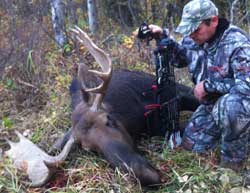
Search and Recovery Position Statement
It is the responsibility of all hunters to give total effort to recover an animal by track and trail until every reasonable possibility has been exhausted. This is a fundamental principle of ethical hunting and is well understood in our heritage
and taught in hunter education.
This ethic, coupled with the fact that the Club’s Records Program records only bow-harvested animals, translates into a policy stating that an animal for which the search was abandoned, and the animal later recovered, will not be eligible for entry.
Wildlife Ballot Initiatives Position Statement

The Pope & Young Club adamantly opposes wildlife management decisions resulting from ballot initiatives which undermine the tenets of the North American Model of Wildlife Conservation. Since the 1842 Supreme Court Martin v. Waddell ruling,
which established the legal precedent that it was the government’s responsibility to hold wildlife in trust for all citizens, the North American Model has evolved into the epitome of how to manage wildlife resources.
The North American Model is internationally recognized as the basis for informed, science-based wildlife management and decision-making processes facilitated by trained wildlife professionals utilizing the best information available and a public process.
All states have in place legislative, regulatory and administrative mechanisms for wildlife management based on empirical scientific data. Emotional rhetoric has no foundation in deciding wildlife management issues.
To ensure that an abundant wildlife population continues for future generations to enjoy, the Pope & Young Club supports the North American Model as the best method to manage our nation’s wildlife resources.
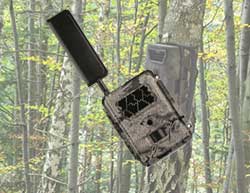
Cellular Trail Cameras / Technology
The Pope and Young Club, historically, has not viewed the use of trail cameras as a violation of the Rules of Fair Chase.
With the invention of wireless trail cameras, as well as other devices that can send real time data to a hunter, all hunters need to consider how the use of these devices may affect fair chase. While the use of a wireless trail camera is not
automatically a violation of the Rules of Fair Chase, using this technology to deliver real time location data of the animal being hunted would be a violation of rule #7 of our Rules of Fair Chase.
For clarification, if you receive a wireless image (photo, video, GPS coordinate, etc.) and it elicits an immediate ( real time) response that guides the hunter to the animal, it would be considered a violation of the Rules of Fair Chase and prohibit
that animal from being eligible for entry into the Pope and Young Club's Records Program. Fair Chase is defined as the ethical, sportsmanlike and lawful pursuit of free-ranging wild game animals in a manner which does not give the hunter an
improper or unfair advantage over the animal.